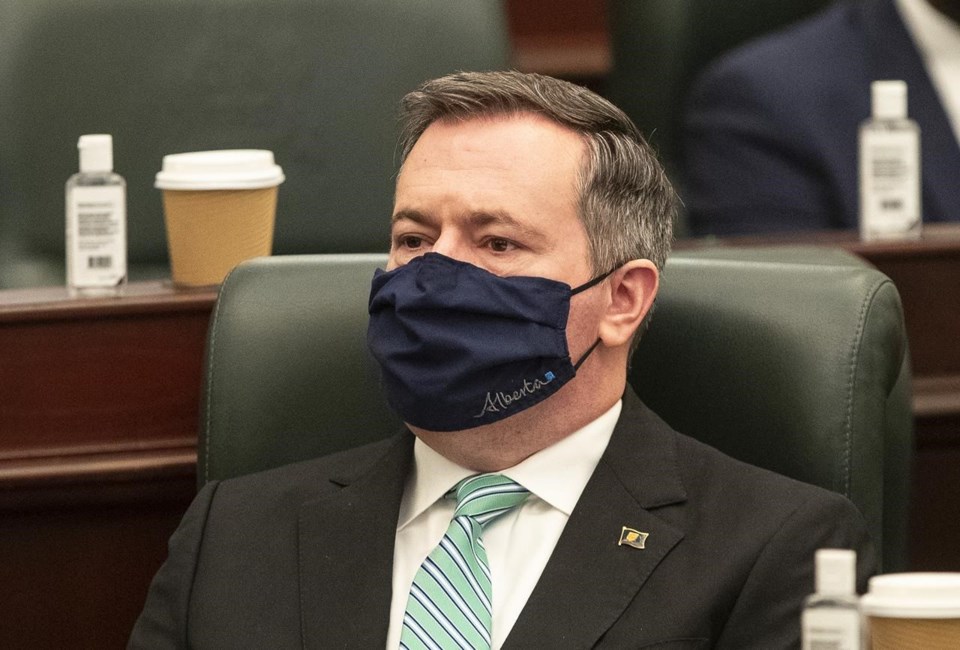EDMONTON — Alberta Premier Jason Kenney says COVID-19 data looks promising as his cabinet committee prepares to meet Monday to decide whether to further ease public health restrictions.
Kenney says the key metric is the hospitalization rate, which has been well under 300 for three weeks.
“There have been little blips up and little blips down, but basically the situation has been relatively stable,” Kenney said Thursday.
“We have enormous flex capacity in the health system, and every day we are vaccinating more and more of the vulnerable.”
The 300 figure was announced in January as the benchmark needed before Alberta could move to the third phase of its reopening plan, which includes entertainment venues such as movie theatres and casinos. It also allows adult team sports.
Alberta’s daily COVID-19 case rates have fallen to a fraction of their peak of almost 1,900 daily in mid-December, due in part to more than 92,000 vaccination doses having been administered.
However, case rates have been ticking up in recent days as the province deals with more contagious variants of COVID-19.
Dr. Deena Hinshaw, chief medical officer of health, reported 505 new cases of COVID-19 on Thursday, including 91 linked to variants. There were 5,085 active cases, about 12 per cent of which were variants.
Some 254 people were in hospital, with 43 in intensive care. One more death was reported to bring that total to 1,957.
Hinshaw has said that the variant first identified in the United Kingdom is mostly spreading through community transmission. A much smaller number of variants first identified in South Africa and Brazil have only been linked to travel.
The variants are more contagious than the original novel coronavirus and can quickly overwhelm the health system if not kept in check.
Hinshaw has said there are many factors to consider when deciding to ease restrictions, but has added it’s critical to look at how the virus, particularly the variant, can rapidly cripple hospital care.
“Many European countries are seeing a third wave in cases, hospitalization pressures, and deaths despite being somewhat ahead of us with vaccine coverage,” said Hinshaw.
Alberta’s economy has been under stricter health rules since a second wave before Christmas threatened to swamp hospitals.
Alberta had around 20,000 active cases and almost 900 in hospital in the week before the holiday. Health administrators were forced to cancel non-urgent surgeries, reassign staff, transfer patients, double-bunk intensive care patients and prepare a field hospital on the University of Alberta campus.
As those cases fell, Kenney announced in late January a four-stage plan to loosen public health measures.
Currently, retailers, restaurants, youth sports, and in-person worship services are open with capacity restrictions. Indoor gatherings remain banned and outdoor get-togethers are capped at 10 people.
Kenney has been under pressure from some rural leaders, as well as backbenchers in his own United Conservative caucus, to loosen up at a faster pace.
On Wednesday, at a Rural Municipalities of Alberta forum, a Vulcan Country councillor called on associate cabinet minister Grant Hunter to acknowledge that the government’s “overreaction to the health risk of COVID has caused great costs to the mental, physical, spiritual and financial beings in our society.”
Hunter replied: “We’re moving as quickly as we can and as safely as we can to be able to do as you say, get out of the way of Albertans.
“I hate to say this, but we’re damned if we do and damned if we don’t.”
This report by The Canadian Press was first published March 18, 2021.
Dean Bennett, The Canadian Press


